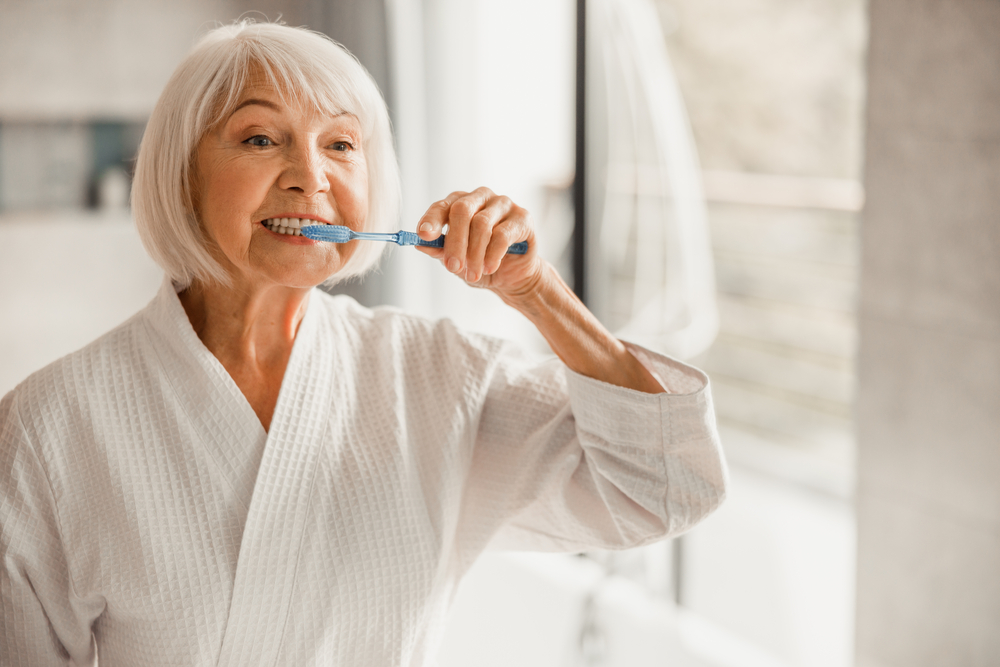
Statistically, one in three American adults between the ages of 50-64 state they’re embarrassed by the overall condition and appearance of their teeth. Additionally, a slightly larger group of 30% cite persistent pain, difficulty eating the foods they once enjoyed, and other health issues in the last two years due to dental issues.
Maintaining excellent oral health habits at home and seeing your dentist every six months for routine cleanings and exams is crucial in maintaining healthy and properly functioning teeth as your body ages, and here’s why.
Your Dental Health Changes As You Age
Having great dental health is vital at any age, but as you get older, the overall state of your teeth and gums can decline significantly without you even realizing it. Tooth sensitivity and tooth loss are not just a fact of life as you age, and with proper care, you can prevent them from happening to you regardless of your age.
Here are the most significant changes in your oral health as you age.
Oral diseases are more common.
Tooth decay and other oral diseases are common among people over the age of 65. Many people who haven’t grown up using fluoride products or water fluoridation to protect their teeth can be at risk for developing poor oral health. After retirement, many people lose dental coverage, and many patients decrease their dental cleanings and exams once they’re no longer covered for these routine procedures.
Your teeth become more sensitive.
Nearly 25% of people between the ages of 65 and 74 suffer from severe gum disease, which leads to tooth loss and receding gums. Receding gums expose tooth enamel, which causes extreme sensitivity, making it challenging to enjoy cold or hot food or drinks or even sensitivity to cold air.
Your medications may be the cause.
Nearly 90% of people over the age of 65 use at least one prescription drug and some drugs can cause excessive dry mouth. A dry mouth can lead to cracked lips, discomfort, and cavities from lack of saliva. If you’re suffering from dry mouth, make sure you’re drinking plenty of water regularly and limit drinks containing alcohol, caffeine, and those that are high in sugar.
You May Need To Boost Your Daily Efforts To Prevent Cavities
Help your teeth remain as healthy as possible by incorporating these cavity prevention tips into your daily oral routine.
Floss Regularly – Even if you are incredibly diligent about brushing your teeth and using a mouth rinse, you still need to be flossing. Cleaning your teeth with floss is essential for removing plaque from between your teeth and preventing cavities and gum disease.
Properly Brushing – Using too much force when you brush or using a toothbrush with hard bristles can cause real damage to your tooth enamel and your gum line. Remember always to use a soft-bristled toothbrush and use gentle motions when brushing your teeth. Use caution when brushing along the sensitive gum tissue line.
Use A Mouthrinse – Choosing the right mouthwash for your dental needs is vital in having your hygiene needs met. A cosmetic rinse will merely control bad breath, while using a therapeutic rinse with antimicrobial agents like fluoride can help reduce gingivitis, prevent cavities, reduce plaque buildup and help treat the cause of bad breath.
Eating A Well Balanced Diet – Don’t fall into diet fads and traps that sound healthy but wreak havoc on your teeth. Diets like juicing can bathe your teeth in harmful ingredients that destroy your enamel. Fresh is best when it comes to your overall health for your entire body – including your teeth.
Regular Dental Cleanings and Exams Should Never Be Overlooked
Even if you take excellent care of your teeth, brush and floss twice a day, and have no apparent symptoms that anything could be wrong with your teeth, you should still be seeing a dentist for regular cleanings and exams twice a year.
Professional Cleanings. Stubborn plaque and tartar buildup can only be entirely removed by a dental hygienist and proper dental tools. Even regular brushing and flossing cannot reach every space in your mouth, and having your teeth cleaned professionally will help prevent tooth decay and other potential issues.
Regular Exams. Just because you’re not experiencing any pain doesn’t mean there isn’t an issue lurking under the surface. By waiting to see a dentist until you’re experiencing pain and discomfort, your problem could now be much larger and more expensive than if you were to have had it caught when it was still small and easily treatable. Exams allow your dentist to catch issues as early as possible with preventative treatments.
If it’s been longer than you’d like to admit since your last professional teeth cleaning and exam, contact Hinsdale Dentistry today to schedule an appointment. Together, we will ensure your teeth are in perfect health to help your smile age beautifully.